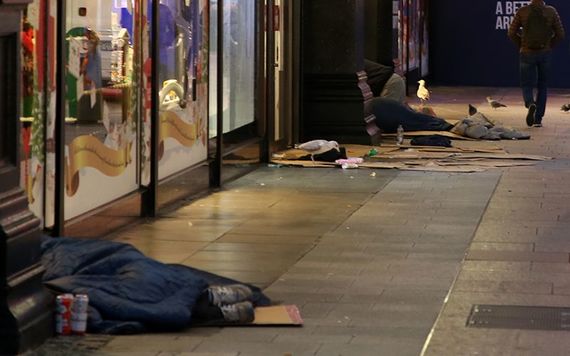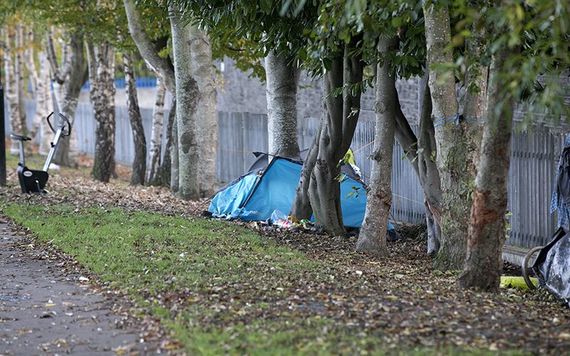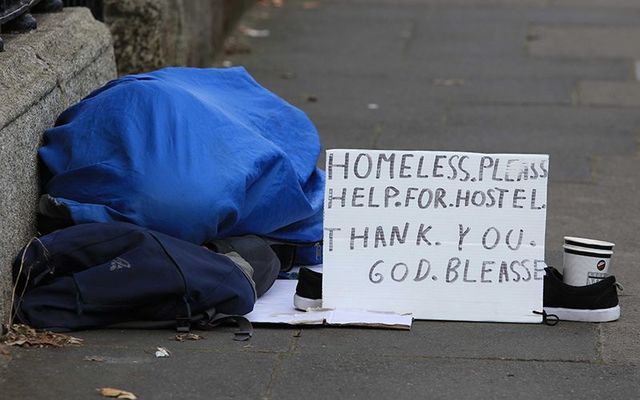Telling it like it is is not appreciated here when talking about the emotive issue of homelessness.
The acceptable approach is to make compassionate noises and bitterly criticize the government for failing to tackle "the homelessness crisis." It's a narrative that is put forward endlessly these days by opposition politicians, left wing activists, charity groups and much of the media.
Last week, however, we heard something different when the director of the Dublin Region Homeless Executive (DRHE), Eileen Gleeson, introduced some awkward reality into the current debate on homelessness here, bringing a storm of criticism down on her head as a result.
“If they’re only getting a cup of soup and they’re homeless it isn’t helpful,” she told councillors. - Eileen Gleeson#MyNameIs #homelessness pic.twitter.com/Yhb8akmvWd
— F. McGrath #SocDems (@fmcgrath19) November 15, 2017
Among the un-sayable things that Gleeson actually said was that volunteers "handing out cups of soup" are not helping to solve the rough sleeper problem in the city. Homelessness is a complex matter that often results from "years of bad behavior." Helping rough sleepers get off the streets is beyond the capacity of well-meaning groups of volunteers doing soup runs.
The implication of what Gleeson said was that these groups are perpetuating the problem by making it easier for rough sleepers to continue to stay on the streets. What they are doing does not encourage rough sleepers to face up to their problems, to make a decision to change and to engage with the services that could help them rehabilitate and find somewhere to live.
Gleeson's message was that rough sleepers, most of whom have alcohol, drug, mental health or other problems, need comprehensive intervention by experienced social workers, not handouts from well meaning but amateur do-gooders.

Homeless line the road, on Henry Street, Dublin 1 at night.
She was referring to the many individual charity groups (up to 30 in the Dublin area) who now do soup and sandwich runs at night for the homeless in the city, often handing out clothes and sleeping bags as well as hot food. If you have visited Dublin recently you may have seen them in action in prominent tourist spots like Grafton Street, College Green and O'Connell Street where they have food giveaways for the homeless at set times after dark.
A few of these charities are the bigger organizations that receive state funding and have experienced personnel. But more of them are small groups of enthusiastic young volunteers who just want to do something.
Moved by emotive stories in the media about the plight of the homeless, they seek out rough sleepers at night and hand out soup and sandwiches. Their concern is admirable.
But the bigger question is whether they are really helping or, as Gleeson suggested, perpetuating the problem by enabling rough sleepers to continue to survive on the streets?
For her blunt comments Gleeson was subjected to a barrage of criticism in the media all last week. She was accused of insensitivity, not knowing what she was talking about, being uncaring, and there were calls for her resignation. It was shoot the messenger time.

Homeless living in tents along the Grand Canal.
The truth is, however, that what she said about homelessness in Dublin was largely correct. This is not surprising since she has headed up the DRHE for the past year, the body set up in 2011 to jointly tackle the problem across the four council areas in greater Dublin and co-ordinate action. With 30 years experience behind her in the city administration, she knows the reality on the ground and all the groups involved.
It's far easier to make dramatic, emotional claims about "the homelessness crisis" and the lack of compassion of the authorities than it is to deal with the often complicated and messy reality. Individual homeless stories make emotional reading and sell papers. For opposition politicians and left wing activists, hyping up the issue allows them to portray the government as right wing and uncaring.
There are a few things to bear in mind about this debate. Opposition politicians, particularly on the left and in Sinn Fein, frequently talk about our "8,000 homeless" and people sleeping on the streets in the same breath. But this conflation of homeless people and rough sleepers on the streets is misleading.
It implies that we have 8,000 homeless people on the streets here, whereas the truth is that the vast majority who lose their homes are in emergency accommodation paid for by the state, in hotel rooms, B&Bs, and the new family hubs. It's not like your own home and it's far from ideal, particularly for the 3,000 children involved. But they are NOT sleeping on the street.
A total of 8,492 people are experiencing homelessness in Ireland, according to October 2017 figures. An extra 118 people became homeless in that month pic.twitter.com/OfNbIsa8WF
— Peter McVerry Trust (@PMVTrust) November 22, 2017
The system is not perfect, and there have been examples of people who end up sleeping in cars or tents because there are delays in finding them emergency accommodation in hotels. These make for tearful interviews in the media, but the reality is they are the exceptions and are usually resolved within days.
Even our overall figure of over 8,000 homeless people is not out of line with other countries, despite the fact that in Ireland we are still dealing with the collapse of the house building sector here after the crash. This was pointed out by Taoiseach Leo Varadkar last week when he said that homelessness in Ireland is "not high by international standards."
This statement of fact brought angry accusations against him of being right wing and uncaring, even though he also said that obviously he does not want anyone to be homeless. But the figures support what he said.
The head of the Housing Agency here agreed with the taoiseach, saying that yes, there is a homelessness crisis in Ireland, "but there is one everywhere." One commentator here last weekend pointed out that the number of homeless people in Sweden, a country usually held up as a model of social concern, is proportionately higher than in Ireland.
As far as rough sleepers are concerned, the number in Dublin right now is somewhere around 250. This is below the number in Boston, for example, a city of similar size to Dublin.
At the moment all the available beds in hostels in Dublin are full on cold nights, although there are free beds available on many other nights. Gleeson said last week that dozens more beds are to be made available in the next few weeks, enough to cope with those who may be turned away at present.
The reality is that many of the rough sleepers on the streets are there by choice and don't like going into hostels. Some don't like the restrictions and the noise and they complain about open drug and alcohol use and a lack of security.
This seems to be an area that can be improved on, although one social worker has pointed out that the more you enforce the rules and make hostels more restrictive, the more rough sleepers with addiction problems will stay away.
The wider homelessness problem, which is separate from the rough sleeper issue, in almost all cases involves people who cannot keep up with the rising rents here, or where their rented property is no longer available because it is being sold or has been taken back by the owner. There is a Housing Assistance Payment (HAP) scheme in place under which local councils in Dublin pay €1,300 a month rent directly to landlords for a family with three children. The family then pays rent to the council, typically in the €50 to €80 a week range, depending on income and welfare benefits.
But finding landlords who will accept HAP payments has become ever more difficult as rents in general have soared. And if these families -- often single parent families -- can't find somewhere to rent they register as homeless and end up in emergency accommodation in a hotel room.
One of the factors involved here is the change in the way our society operates, something that also is evident in other western countries, all of which seem to have homeless problems. Family support structures that used to be there a generation or two ago no longer function.
You would think that most single parent families -- typically a single mother with one or two children -- who become homeless would be able to move in with parents or grandparents or siblings or friends. But frequently that is not the case, and one hears the excuse in media interviews that "I don't get on with my family."
So instead of being a problem that the extended family might solve, as used to be the way years ago, it becomes a problem for the state. There is an immediate assumption that the state has a duty to step in and provide accommodation without question or delay.
In some cases, there is a reluctance to move in with extended family because the homeless person is afraid it will lengthen their waiting time for social housing if they no longer appear to be an emergency.
Most media coverage of the homeless situation here is superficial and self-serving, designed to stir emotions rather than provide in-depth analysis of individual cases and the factors that led to their homelessness. Some questions are not asked at all, like whether the father of the children is helping (the majority of cases are single mothers with children). Or whether parents or grandparents have spare rooms in their homes.
To really understand this problem we need much more detailed analysis of those who are homeless --- income, marital status, details of partners or ex-partners, details of extended family and their accommodation, and so on.
Of course we need extra social housing provided by the state, and the government is committed to a substantial program which is beginning to get underway. But the reality is that after the crash 10 years ago all construction here stopped and it will take us considerable time to catch up. In the meantime we have a distorted market with soaring rents and high prices for the property that is for sale.
The wonder is not that we have a homelessness problem here (even if it's not out of line with other countries). The wonder is, after the crash, that it is not far worse.




Comments